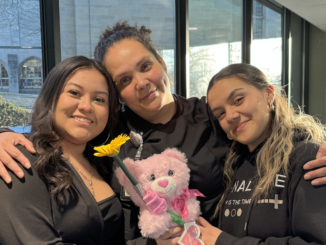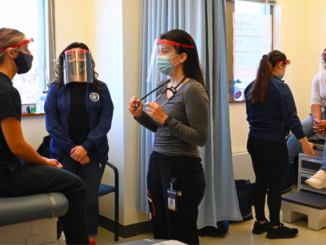
Katy Agans
Contributing Writer
Dominican’s Wellness Center is trying a new approach to mental health, through improvisational acting therapy for students.
Counselor Joyce Mojica runs the improv therapy.
Mojica originally got the idea to start an improv therapy group on campus after being trained in improv herself. She said she thought it would be a fun way for students to connect with each other while also getting to de-stress and have fun.
The sessions themselves consist of short getting-to-know-you improv games. An example of this is a game in which students stand in a circle and give the person next to them three compliments. This helps students start to observe their surroundings while also learning how to support others in the group.
After everyone feels comfortable with each other, the games shift to focus on helping students get out of their heads and be present in the moment. This includes playing more improv games as well as students improvising short scenes based on audience suggestions, according to Mojica.
Mojica emphasizes that the main focus of these sessions is to use improv techniques to help students work on being present in the moment in a fun and safe environment.
“The point of improv therapy is to learn mindfulness, staying present, laugh, and just generally having fun,” she said. “Improv is focused on being present in the moment, building trust and just responding rather than overthinking. The elements of improv focus on mindfulness and relationship building. It helps students begin to notice what’s going around them and respond in the moment rather than thinking too far ahead.”
The goal is for students to leave each session feeling lighter and less stressed, according to Mojica.
Allie Wright, a junior who participates in improv therapy, echoes these sentiments.“ I always look forward to improv therapy because it’s so much fun! I love hanging out with other participants and letting off steam. It’s so relaxing and I always leave feeling good,” she said.
This is a form of group therapy, meaning people get the chance to connect with one another while also learning how to develop coping skills. It’s not about being good at improv, but rather learning how to be OK with making mistakes, building relationships, and focusing on mindfulness, according to Mojica.
Improv can seem intimidating to a lot of people. Mojica is aware of this and doesn’t want this hesitation to keep people from participating.
“I would say, come try it, lean into the unknown. That’s partly what improv is about. I was intimidated at first, which is why I took improv classes in the first place! I loved it so much that I wanted opportunities to play. The one thing to do is bring an open mind and an attitude of play. Laughter is good way to cope with stress,” she said.
Even if students have improv experience, improv therapy can be a place where students can let go of the idea of preforming and just have fun.
Emma Brandenburger, a senior and president of the improv team on campus, feels like the eliminated pressure of performing allows her to relax during the sessions.
“It was a nice environment to unwind,” she said. “It doesn’t feel like you need to be good. It feels like the stakes were lower and it was just fun. It was calming.”



